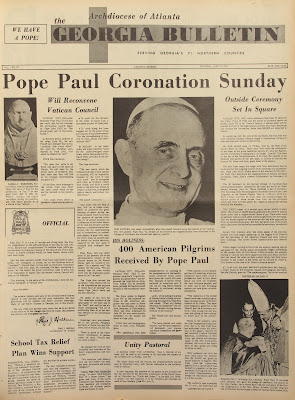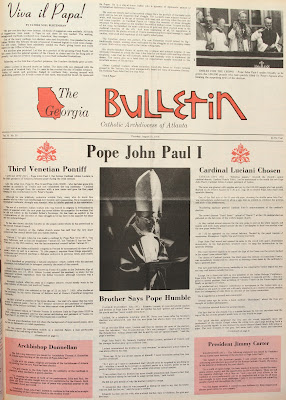IN ST. PETER’S SQUARE
MARCH 13, 2013
Father Luke Ballman, of the Atlanta Archdiocese, serves at the North American College in Rome. He spoke to The Georgia Bulletin March 13 by phone after witnessing the announcement of the election of Pope Francis and the pope’s first public appearance on the loggia of St. Peter’s Basilica.The previous night, March 12, I went to the square for the first time (since the Conclave began) and I saw black smoke (that no pope had been elected). The last Conclave (when Pope Benedict XVI was elected) saw some confusion regarding the color of the smoke; there was certainly no confusion tonight. The smoke was as black as black could be. It was exciting to be there. The crowd was excited, and we recognized we were part of history in the making.
There was a cheer from the crowd when the smoke appeared. A bit of a surprise that we would cheer for the fact that the vote resulted in “no pope.” I think, however, that the energy level was high, and we were all excited just to be present to see history being made. I was also surprised at how large the crowd was. It was a cold, rainy night—umbrellas prevented a good view of the large screens that showed us “up close” the chimney; the umbrellas also made it difficult to see the chimney itself.
I thought a few curious pilgrims would be present, and yet the piazza was full. When we saw the black smoke it didn’t take long for the piazza to empty itself of pilgrims. We trudged back to the seminary in the rain, wondering how long the Conclave would last. No one really thought we would have a new Pope on the first vote. Our anticipation continued to grow that evening though and the following morning as everyone wondered who the new Pope would be and when he would be announced. I missed the smoke on the morning of March 13. I was planning to go to St. Peter’s Square, and then the smoke rose early, just as I was getting ready to leave the seminary to head down. I was determined that would not happen to me again.
On March 13, I had lunch at 1 o’clock with Archbishop Gregory. He took all of the Georgia men from the seminary out to pranzo (our main meal which is served midday in Italy). We are two seminarians and two priests who serve on faculty. There was much discussion about the process of electing a pope, what the cardinals might be thinking, how a papal name was chosen and when, and whatever else we could think of to discuss regarding the Conclave. We were able to pick his brains about his work with ABC News (as a commentator on the Conclave) and what his thoughts were on the process. While we were far from home, we were also a little piece of Georgia present at a restaurant in Rome less than a mile from St. Peter’s where history was being made. It was a wonderful family gathering with our father. He was shepherding us just like any father would try to help his children to better comprehend what was happening around us. There was much laugher, prayer for the cardinals, and good camaraderie.
About 5:15 in the evening, I headed down to St. Peter’s Square. It was rainy and cold again, and I had my trench coat on and an umbrella with me. I walked with a seminarian from the College; we soon found ourselves with other Americans huddled in the cold rain. We waited and waited. Although we knew that the evening smoke would not be present until after the second ballot of the afternoon, we decided to go to the square to “see” the outcome of the first ballot. If the first ballot did not elect a pope there would be no smoke (black or white), and if the first ballot did elect a pope there would be white smoke immediately. Under no circumstances did we want to miss the possibility of seeing the white smoke. What if we had a pope after the first ballot of the afternoon, and we weren’t there? So there we stood in the rain, getting colder by the minute. Eventually we realized there would be no smoke—the first ballot of the afternoon did not elect a pope. Now what? Should we stay in the piazza for another hour to wait, or head back to the seminary for an hour? We decided to stay for the second ballot rather than coming back up to the seminary only to return later, so that we wouldn’t have to stand in a security line a second time that afternoon to enter the square.
From talking to the archbishop at lunch, we expected that we would see smoke by 6:45 p.m., unless they elect a pope (which would require more time for preparations before the smoke). By 6:45, 6:55, no smoke. People are talking. Maybe this is it. …
Then the smoke started coming out and everyone started cheering. It looked kind of white at first and then grey. What was going on? Then we heard the bells. Sure enough, it was white. Everyone started cheering and clapping. The piazza was crowded, and we knew that it would soon become so packed we wouldn’t be able to move. The crowd started moving, and we started moving with it. Everyone wanted a good view of the loggia, the balcony from which the pope would be announced, and from which the new pope would emerge to give us his first blessing. We were able to move to the front of the crowd, about 20 or 30 rows back, right in the middle of the square.
In the meantime, the bells of St. Peter’s continued ringing and that brought tears to my eyes. They just kept ringing and ringing and ringing, and all the bells around Rome just joined in. Habemus papam! We have a pope! But who? The excitement continued to mount as more and more people pushed themselves into St. Peter’s Square. We looked around for other Americans from our seminary. When we saw one another we cheered the same thing to one another across the crowded square that people were crying in every imaginable language, “We have a Pope!”
Then we heard the sound of a drum and we saw the Swiss Guard marching in. They started in the back of the piazza. They were in full regalia, marching in formation. It was all pomp and circumstance, all at once. How did they get ready so soon? Were they “on call” after every ballot, so that they could march into the square at a moment’s notice? They were joined by an Italian honor guard, and other groups as well. It was utterly amazing. We were in the midst of this holy, regal, sacred moment. They all got to the front of the piazza. The Swiss Guard and the others who marched in stood at attention.
Then the lights went on at the level of the loggia of St. Peter’s. I had never seen that before. Everyone started crying out in whatever language, mostly Italian, “Long live the pope.” The cardinal came out and announced, “We have a pope.” There were Italian flags, French flags, German flags, American flags, Spanish flags and I believe Argentine flags. In Latin the cardinal told us his name, from Argentina, and that he would be called Francis. I had never heard of him before. The crowd was jam-packed into the piazza and the street leading into it. People were cheering and texting and making phone calls. Everyone started chanting, “Francesco, Francesco, Francesco.” It was so celebratory, so full of joy. It was like the Italians had won the World Cup, but it was better than that. There was laughing and chanting.
The rows of windows became filled with the red color of the cardinals’ vestments. Then Pope Francis came out and the crowd just erupted with applause and cheering. I think the first thing he said was “Buonasera, Roma,”—“Good evening, Rome.” “The first thing I would like to ask you to do is to pray together for my predecessor, Bishop Emeritus Benedict.” The crowd was completely silent as we prayed for our previous pope, and our new one. What had been this raucous, rock concert sort of atmosphere went silent. Wow. Then he left and the curtains were drawn.
The first impressions I have of him as a person: he was very humble, he was very happy and yet also seemed just to be a person who really wanted to connect with the people. I began thinking right away, why did he choose the name Francis? He’s a Jesuit, so Ignatius may have been a more understandable choice. And then I started thinking of St. Francis. When Francis received his vocation from the Lord, he got the message, “Francis, rebuild my church.” And maybe that is the message our Holy Father wants us to get from his pontificate. The other thing I thought of is Francis is the peacemaker. We think of the great events held in Assisi to pray for peace for mankind.
Then I learned he chose not to live in the bishop’s palace, but rather to live amongst the poor in his diocese, that he takes the bus to work, that he is very humble that way. He is the first Latin American pope. It says a lot for the church in Latin America, for the church in the Archdiocese of Atlanta that has such a huge Hispanic population.
We made our way back up to the college, all 250 of us. We gathered for prayer in the chapel, which had been planned ahead of time. We sang the “Te Deum” and then we prayed silently in front of the Blessed Sacrament for our pope. February 11, 2013, the day when Pope Benedict announced he would abdicate the papacy, seems so long ago. And yet it was just over a month ago. There were so many questions then; now all seems right with the Church again. We have a pope. Long live Pope Francis.
++006A.JPG)
++003A.JPG)
++003A.JPG)
+001.JPG)



++006A.JPG)
+++009.JPG)
